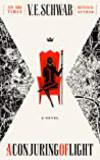
And so it ends. Where A Gathering of Shadows was the bright(ish) interlude, A Conjuring of Light goes dark quick. The magic that killed Black London is free in Red London and trying it’s damnedest to … take over the world? It’s a little unclear. I guess a piece of sentient magic gets a pass on the ’evil for the sake of being evil’ card.
Characterwise, we don’t really have anyone know, although we get a lot more of Rhy who actually gets to explore being given a literal second chance at life and what it means to be king. Speaking of which, King Maxim and Queen Emira had a lot going for them. I … just wish they were developed a bit more. Rhy’s relationship with Alucard gets a fair bit more time. It’s complicated (in a good way) and well done. I wish them the best.
Holland actually grew quite a lot as well. He’s really the surprise star of the books, given that he was the big bad back in A Darker Shade of Magic and… well… died back then. Antari are tough.
Unfortunately, Lila remains just as bad-ass and quirky as she was A Darker Shade of Magic. What? Unfortunately? Yup. She doesn’t really seem to have changed much. She’s still a thief, which is fun, but now she’s also far more powerful than she should be and capable of doing just about anything. She’s still by far my favorite character of these books, it’s just starting to grate.
She was a thief, a runaway, a pirate, a magician.
She was fierce, and powerful, and terrifying.
She was still a mystery.
And he loved her.
Kell doesn’t really change much either. And the one big question we’ve been going through the entire series–where did he come from… he literally destroys the answer as given. It’s more ‘real’ but rather unsatisfying.
And that brings us to Osaron. As a big bad… he’s sort of one dimensional. He wants to make everything like Black London (which turned out so well for him last time). Despite turning everyone into magic zombies and raising a giant palace out of… magic, we pretty much exactly how this is all played out. And he doesn’t have much character.
Anoshe was a word for strangers in the street, and lovers between meetings, for parents and children, friends and family. It softened the blow of leaving. Eased the strain of parting. A careful nod to the certainty of today, the mystery of tomorrow. When a friend left, with little chance of seeing home, they said anoshe. When a loved one was dying, they said anoshe. When corpses were burned, bodies given back to the earth and souls to the stream, those left grieving said anoshe.
Anoshe brought solace. And hope. And the strength to let go.
Quite a series. I’m glad to have read it.
Anoshe.